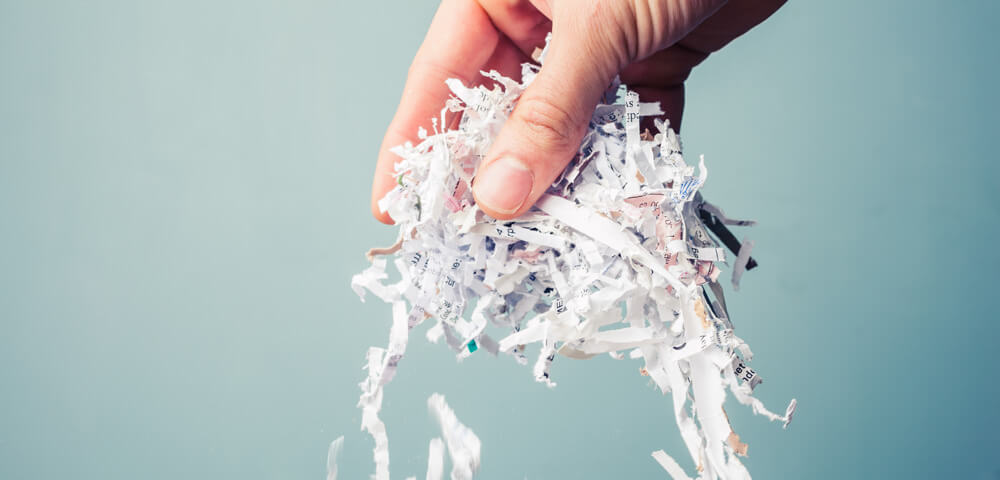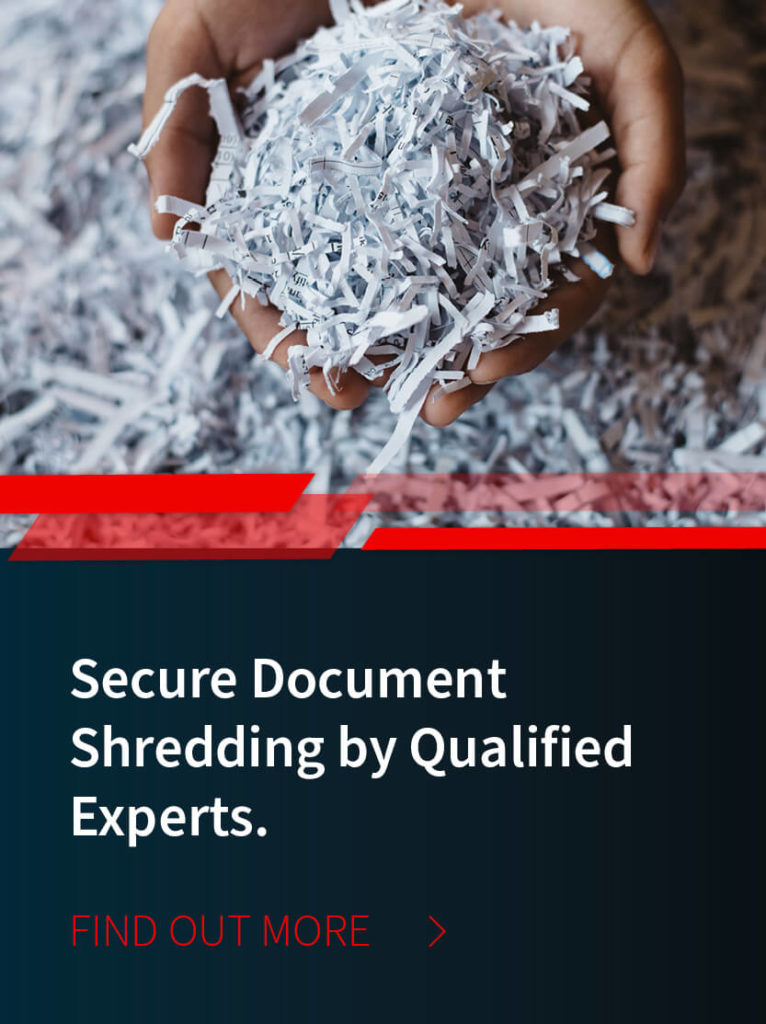
/ IN THIS BLOG
Medical document shredding is an important consideration for any medical facility. Not only does it protect a patient’s private information, but it also maintains compliance with Health Insurance Portability and Accountability (HIPPA) and Occupational Safety and Health Administration (OSHA) requirements. As with many HIPPA and OSHA requirements, being in full compliance reduces the risk of fines and other punitive actions against your facility for non-compliance.
01 / Document Purge Requirements
If you run a medical facility that treats patients, it’s almost certain you produce sensitive documents that need to be properly disposed of in order to ensure that information doesn’t get into the wrong hands.
Medical records are often purged after a certain amount of time, but this process depends on the size of the facility and its storage space for medical records, as well as the retention guidelines of the specific facility. The process of purging separates inactive records from active records. While most medical records today are digital, there are still tens of thousands of stored medical records found in storage that need to be properly disposed of – and protect personal health information from getting into the wrong hands.
Medical facilities should refer to Code of Federal Regulations Title 42 regarding purging schedules. However, every state may also have their own guidelines. Medical facilities can also refer to state regulatory provisions here. The state of Georgia requires that medical doctors must keep records for 10 years following the date the record was created. Hospitals must keep the records of adult patients for five years. They must also retain the records of minor patients for a minimum of five years after the minor has reached the age of majority, so age 23.
When it’s time to purge, decisions must be made on how records are to be destroyed and the costs associated with that process.
02 / What you need to know about Medical Document Destruction Costs
Medical record destruction may be done by the medical facility as long as processes are compliant, or by a third party. While doing it yourself seems like the obvious way to save money, it might not make sense in terms of your bottom line. Costs associated with a facility that decides to shred or otherwise destroy medical records must take a number of factors into consideration. For example:
The equipment to do the actual shredding
Any maintenance required for that machinery
The electricity to run the machine doing the actual shredding
The number of man hours required to do the shredding (each hour of which takes away from time that could be spent on other job duties)
Costs of renting mobile shredding machines, which can handle up to about 300 pounds of paper. Costs for delivery of equipment and pick-up will also be included.
Once all these factors are taken into consideration, it often makes sense - even from a financial perspective - to have another company come in to deal with your document destruction needs.
03 / How much does Document Destruction Cost?
Costs of medical document destruction depend on numerous factors: volume, specific company, geographic location, and more. As a ballpark figure, though, expect a twenty-eight-gallon bag to cost about $35. But professional and confidential shredding service costs vary.
Boxes of paper for destruction can typically average a flat rate of $1.00 per pound. Costs may also depend on how many boxes or bins need shredding on a monthly basis, which can average $90 per month to over $1,500 per month for medium or large scale shredding services. The type of shredder (strip-cut, cross-cut, confetti-cut) will also affect costs.
Hospitals and smaller medical offices often utilize bins placed in the office by a waste management company that will be emptied on a regular basis for shredding. Employees simply discard anything sensitive into that receptacle. When it’s full, the waste management company will either haul it away for shredding at their facility or do it on-site.
04 / Third-Party Document Destruction
Do-it-yourself medical record destruction increases the risks of non-compliance in many scenarios. Therefore, medical providers can enjoy a ‘convenience factor’ of having a reputable waste management company come in and take care of your medical record or document destruction needs. Not only does this mean your employees don’t have to go through the hassle, but also means having this important facet of your business handled by a company specifically experienced and trained in this particular sector of waste management.
Working with a reputable company will ensure they know and follow protocol. That includes
Never simply throwing away anything with sensitive information. While it used to be commonplace to just throw some items in the trash, HIPPA laws and requirements are much stricter about ensuring these items are shredded.
Everything must be kept under lock and key. Whether the documents are being stored in a bin and awaiting destruction or being transported to a location for shredding, the items can never be unsecured, nor are they accessible to staff or unauthorized personnel.
If a driver ever does leave the truck during the course of a transport, that truck remains locked and secured. Every time. When the documents arrive at the waste management or shredding facility, they are stored in a locked-down storage area.
05 / Why a Full-Service Medical Waste Management Company Makes Sense
If you’re already using a full-service medical waste management company for your other waste-related needs, document destruction should be an extremely easy service to add. Just ask if document shredding is a service they offer. If they do, you’re in luck! This means you don’t have to mess with calling a slew of companies to find competitive prices or trustworthy crews. You’ll be set.
Key Takeaways:
Properly destroying documents is an important facet of your medical facility. It keeps patients’ private information secure and prevents you from incurring fines for violating HIPAA.
Hiring a third-party to perform this task can actually end up being both more convenient and more cost-effective
For more information about the importance of shredding documents and their associated costs, contact our team at MCF either by phone on 866-315-8116 or by requesting to speak to one of our experts below. With 30+ years experience serving medical clinics and healthcare institutions in the secure destruction of confidential records, we are confident that our solutions and our expertise will be a right fit for your medical document destruction needs.
Robert Losurdo
President, COO








